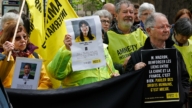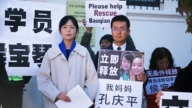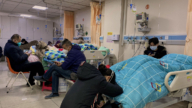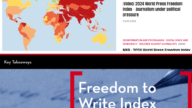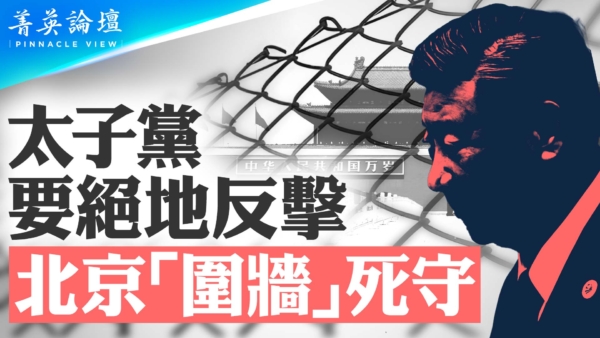【新唐人2011年4月15日讯】在中共政府的预算中,被踢爆有多数被认为“不适宜”公开的条目,都隐藏在“其它支出”中。而在““其它支出”类别里面,还有“其它”项,凡是不好处理、超标的费用都罗列其中。而所谓的“维稳费”呢?是不是也隐藏在“其它”项目里面?请看下面这则报导:
近年,中国的审计部门在审计中发现,“其它支出”的名目使用频繁,金额很大,尤其在基层政府的财政开支中更加严重。《经济观察报》10号报导,近几年来一些地方政府的“其它支出”,占财政总支出的比重非常高,有的在30%甚至40%。
《法国国际广播电台》11号在相关报导中说, “在如迷宫般的预算条目中,‘维稳’等支出是如何做大膨胀” ,《经济观察报》从“侧面”回应了这个说法。
《经济观察报》举出,安徽省宿州市灵璧县审计局在审计中发现,不好处理、超标的费用都罗列在“其它支出”中。一位财政官员也说,“支出能靠民生的早就靠了,有一些不便暴露的就放在其它支出”。
而今年财政部公布的预算报告估计,中共政府今年花在警备、国家安全、武装民兵、法庭与监狱等“维稳”费用,将达6240亿人民币。
美国哥伦比亚大学政治学博士李天笑:“2007年以后,把它(维稳费)纳入了…按照功能来分,作为‘国家安全费用’一大类,这其中主要包括像武警、公安、国安,还有检察院、法院、司法、行政、监狱劳教、国家保密等等这些人的花费和开支。但这里面有一点很重要,就是它这个开支只是按照这种功能,发到这些人头上去了,至于这些人在干什么事情,它是不管的。”
国外媒体分析指出,中国军事国防的实际支出,其实远超过官方预算,因为必须纳入如进口武器等关键项目,但同样的国内安全预算,也没有包括所有的所谓“秘密监控费用”。
美国哥伦比亚大学政治学博士李天笑:“另外光北京这次两会就有70万的红袖章,这些人的费用﹔另外像镇压法轮功,当时在2001年的时候,整个国民收入也就是2万多亿,那时候花了1/4的钱镇压,广场上一天就要花200万,每年都花大量的金钱用在镇压人民的项目上。”
《经济观察报》的报导还举出,“其它支出”类目如此受地方政府青睐的原因有二:一是看不到具体支出用途,人大审议时好通过;二是预算法规定,年度中财政资金在科目间“流转”不需人大审批。如2009年被调查的湖南省浏阳市广电局长的奢侈消费清单中:足浴中心、餐厅包厢、西餐厅、水疗中心等,都是通过“其它支出”列出来的。
重庆市民李运生向《自由亚洲电台》说,在民主国家,选民对各级政府财政预算有监督权,各种媒体也能对官员挪用公款进行有效监督,但目前在中国是党政官员自己监督自己,
新唐人记者李庭、周天综合报导
====
Behind ’Other Expenses’
Reportedly, the Chinese Communist Party’s (CCP)
government’s budget has many entries unsuitable
for the public eye, thus hidden as ‘Other expenses’.
The ‘Other expenses’ category has ‘Other’ option.
All things difficult to deal with or exceeding budget
are listed here. Would by any chance the so-called
‘maintaining stability fee’ hide in the ‘Other’ items?
In recent years, China’s Audit Department found
that the nomenclature of ‘Other expenses’ was used
frequently, and the monetary amount was huge,
especially at the grassroots level of government
expenditure. Economic Observer reported
on the 10 April,that in recent years ‘Other expenses’
of some local governments has a very high share
of the total expenditure, some is 30% or even 40%.
Radio France Internationale reported on April 11:
”In the labyrinth of the budget, how did the ‘stability
maintenance fee’ and ‘Other expenses’ expand?”
Economic Observer responded to this issue ‘edgewise.’
Economic Observer wrote that an Accounting Office
in Lingbi County, Anhui Province, found that tricky
and excessive costs are all listed in the category
‘other expenses.’A financial official also said,
”Expenditures which relate to people’s livelihood
are the same, just some inconvenient to reveal
are included in the ‘Other’ expenses.”
Ministry of Finance announced this year’s budget,
estimating that expenses on national security,
armed militia, courts, prisons and other
‘stability maintenance’ costs of the Chinese regime
this year will reach RMB624 billion.
Li Tianxiao (Ph.D.,Polit.Science, Columbia Univ.):
”After 2007, it (‘stability maintenance fee’) was
in accordance with the feature, listed as the cost
of national security, which includes armed police,
public security, national security, prosecution, courts,
judicial, administrative, prisons, forced labor camps,
national secrets. But the important point is that
the funds are distributed to them under those names,
however nobody supervises after that
what people are exactly doing with them."
Foreign media analysis pointed out that China’s
actual military and defense spending is far more
than official budgets, because the import of weapons,
etc., must be included as key items. Similarly,
domestic security budget does not include
the so-called ‘secret monitoring costs.’
Li Tianxiao: ”Besides, in Beijing there are 70 million
of the two red armbands, the cost of these people?
Also the persecution of Falun Gong, in 2001 the
national revenue was over RMB2 trillion and
CCP spent a 1/4 of it on Falun Gong suppression.
It spends RMB2 million a day on Tiananmen Square.
A lot of money are spent on people’s suppression.’
Economic Observer reported, there are two reasons
why ‘Other expenses’ category is so favored
by local governments. Firstly, one can not find out
the specific objects of expenditure and it’s easier
to be approved National People’s Congress (NPC).
Secondly, according to the budget law, during
a fiscal year financial resources can ‘flow’ between
subjects without Congress’ approval. For example,
in 2009, an expenditure list of the Director of Radio,
Film and Television in Liuyang, Hunan Province,
showed spa center, restaurants, private rooms, etc.,
which were all included in the ‘Other expenses’.
Li Yunsheng from Chongqing told Radio Free Asia,
that in a democratic country, voters have
the supervision of government’s budget at all levels,
and media can also be effective in monitoring
officials’ defalcation. But in China it is the CCP
and government officials that monitor themselves.
NTD reporters Li Ting and Zhou Tian




